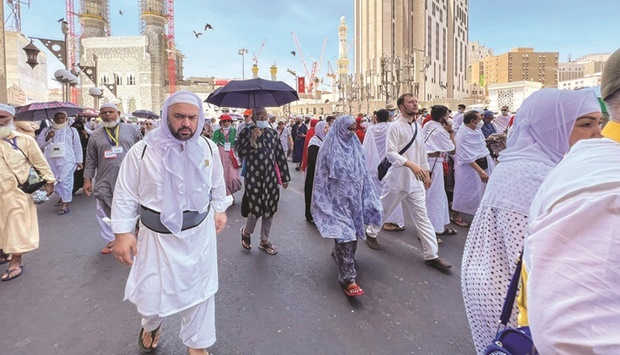White-robed worshippers from around the world have packed the streets of Islam’s holiest city ahead of the biggest Haj pilgrimage since the coronavirus pandemic began.
Banners welcoming the faithful, including the first international visitors since 2019, adorned squares and alleys, while armed security forces patrolled the ancient city, birthplace of the Prophet Muhammad (peace be upon him).
“This is pure joy,” Sudanese pilgrim Abdel Qader Kheder said in Makkah, before the event which officially starts tomorrow. “I almost can’t believe I am here. I am enjoying every moment.”
One million people, including 850,000 from abroad, are allowed at this year’s Haj after two years of drastically curtailed numbers due to the pandemic. The pilgrimage is one of five pillars of Islam, which all able-bodied Muslims with the means are required to perform at least once.
Yesterday afternoon, pilgrims carrying umbrellas to shield themselves from the scorching sun flocked to souvenir and barber shops in Makkah, while others shared meals under palm trees on streets close to the Grand Mosque.
Many new arrivals had already begun performing the first ritual, which requires walking seven times around the Ka’aba, at the centre of the Grand Mosque.
At least 650,000 overseas pilgrims have arrived so far in Saudi Arabia, the authorities said on Sunday.
In 2019, about 2.5mn people took part in the rituals, which also include gathering at Mount Arafat and stoning the devil in Mina.
The following year, when the pandemic took hold, foreigners were barred and worshippers were restricted to just 10,000 to stop the Haj from turning into a global super-spreader.
That figure rose to 60,000 fully vaccinated Saudi citizens and residents in 2021.
Pilgrims this year — only those younger than 65 are allowed — will participate in the Haj under strict sanitary conditions.
The pilgrimage is a powerful source of prestige for the kingdom and its Crown Prince Mohamed bin Salman.
Days after the Haj, Prince Mohamed will welcome US President Joe Biden.
Masks are no longer compulsory in most enclosed spaces in Saudi Arabia but they will be mandatory at the Grand Mosque, the holiest site in Islam. Pilgrims from abroad will have to submit a negative PCR test result.
The Grand Mosque will be “washed 10 times a day... by more than 4,000 male and female workers”, with more than 130,000 litres of disinfectant used each time, authorities said.
Since the start of the pandemic, Saudi Arabia has registered more than 795,000 coronavirus cases, 9,000 of them fatal, in a population of about 34mn.

Muslim pilgrims arrive at the Grand Mosque in Saudi Arabia’s holy city of Makkah, yesterday.
